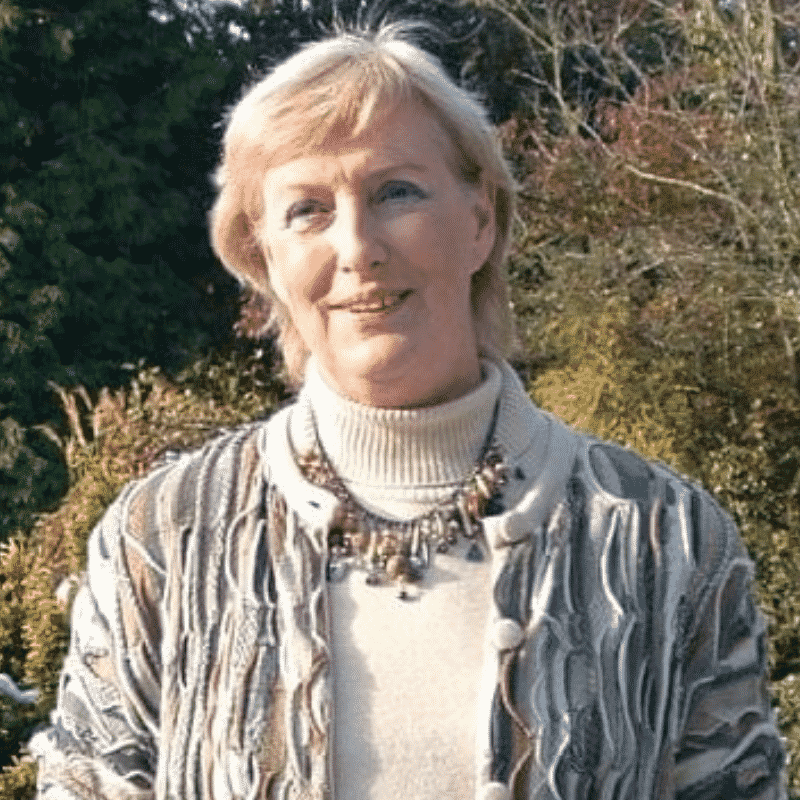Margaret Harrison
“Ordinary human beings have an extraordinary capacity to give and to share. Kindness, caring, a sense of humour, optimism, respect, trust: all those human qualities are central to our work. We don’t need PhDs in Psychology to do Home-Start. We need to express our humanity. When another family feels that humanity, they in turn feel themselves enabled to express it to other people. So, our central philosophy is to be kind to those who need our support and help.”
– grundlægger af Home-Start

To be kind
7,000 Home-Start volunteers are helping 40,000 families and children.
HOW DID YOU GET involved with Home-Start?
When our own children were young I did a lot of voluntary work in Leicester with young families. For example, on a Thursday morning I used to go to a drop-in centre. As a mother myself I would look after the children in the kitchen while the parents did “group work” with the social workers in the living room. In those days I very much wondered “What is group work?” and what were they doing with the social workers? I just looked after the children.
Then one by one the mothers would come through the kitchen to use the outside toilet and they’d stand and talk with me. They’d say, “Oh, Margaret, I’ve been up again all night with him. Do you think I should take him to the doctor, or what do you think?” And I’d say, “If you’re worried, you take him to the doctor. Shall I come and look after your little girl?” So a lot of them said, “Come and see me at home, Margaret, so that we can really talk.”
I realized that they needed someone with time, to listen, to be with them in their own homes where their problems exist, and to help in a practical way. In those days I was involved with sixteen children’s homes in Leicester, which were stuffed full of children in care, who’d been taken away from their parents.
I was asked to find volunteers to befriend some individual children. And that was a lovely job. I went round the children’s homes. I got to know the children who had lost touch with their parents. I had to advertise and find volunteers to be a friend, an aunt or an uncle, to that child. So I learnt a lot about working with volunteers. I also learnt a lot about the needs of the children. It made more sense to me that we spend our time supporting the whole family before it breaks down.
So, at that time, there was no organization like Home-Start?
Nothing at all.
With these two experiences, how did the idea of starting the organization come to you?
I thought then that what we needed to do was to find other volunteers like myself who are parents, who have time to offer support, friendship, fun and practical help to a young family experiencing difficulties. It was as simple as that.
And what was the year?
In the early 1970s. I asked Council for Voluntary Services to help me to find a grant, an urban aid grant of less than £2,000 a year, so that we could pay our volunteers expenses. And we just needed a little administrative centre from which we could run it. Everything else we would find free. Also I went to the different Departments, to Health, Social Services, Education, Probation, Relate, and everybody said, “What a good idea.” It is so important to work alongside the statutory agencies to help families.
Did you feel that the statutory agencies were not able to cope with the volume of work, and also give a kind of emotional and informal support?
Absolutely. The statutory agencies didn’t agree with giving emotional support. They felt that their workers had too much to cope with to get so involved with individual families. But I felt that volunteers, if they only have one or two families at a time that they support, then they can become emotionally involved; and what I’ve learnt is that when you become emotionally involved with a family and you worry about them and you laugh with them and you cry with them, then big changes begin to happen — and that’s the thing that the professionals don’t have time for. So we felt we weren’t there instead of the professionals; we were there in addition to the professionals.
When you started, how many volunteers did you have?
We started off with fifteen volunteers and had a course of preparation — we don’t call it training. The course of preparation is very much to help the volunteers appreciate and value what they’ve learned in life and also what other resources exist in the community.
Then, very tentatively, some of the local services dared to refer families to us, and we were so grateful. I myself took on the first family that was referred to Home-Start. I thought I must be a few pages ahead of the volunteers. It actually went badly wrong. It was a young mother who was seventeen. She had two children, and used to tell me the most awful things about them. After a week or two she didn’t let me in any more. She told the social worker that she thought that I would help her get the children taken into care; because she wanted at seventeen to be rid of her children and have fun with her friends and not have the responsibility any more.
By that time I was already introducing my volunteers to other families who’d been referred. I had great admiration for how they were succeeding. Then later that year a family was referred where there had been tremendous child abuse. I didn’t have a volunteer left by then because they were all busy visiting. So I took that family on myself and found that the mother really had a good relationship with me. When I said, “You’ve got so many professionals, Pat. I’m sure you don’t need me to visit you,” she said, “You’re the one I want.” And we talked about her health and other problems. On the third visit she already had sorted out some clothes for me, to give to other young children, although she was one of the poorest women I’ve ever come across in Leicester. And after six months she became helpful in our weekly family group where the parents and children could meet. She said, “Margaret, I’ll help you keep lists of birthdays.” And then when her youngest went to school she became a Home-Start volunteer herself.
How did you get this name, Home-Start?
Because everything else happened in centres or offices. Many families had told me that they needed me to see them at home. So we said it would be important to start at home. Also we would only focus on families where there was at least one child under school age, at the start of their lives. At the time in America they had Head Start, so we called our venture Home-Start.
I see. Very nice name. How were the early days?
At first it was quite slow to get referrals. The health visitors didn’t trust us then. They said they had a very long training, and here were we with volunteers, just other parents, going into the home. What if we gave wrong advice? When they realized that what we were providing was support, friendship, practical help and fun, they started to trust us. After two years they were our best referrers. So, getting referrals was quite slow. Also finding volunteers was sometimes quite difficult.
In the early days we had a wide variety of referrals. Some were lone parents; sometimes we were given referrals where all the other agencies felt they had failed. It was as if they said, “Oh, well, let’s give this family to Home-Start.” We didn’t have any perception of where we wanted that family to be. What we said then and what we still say now is, “I’m here for you, for whatever you want to happen, for as long as it takes.” The families felt very supported and unhurried. They didn’t feel that we were working by contract so they had to change. It was their choice to invite us into their home. When they realized that they didn’t have to have us, they virtually all said, “Yes, that’s what I need — another mum to give me a hand.”
I think of Anna, for example. She was a young single person who’d grown up in care. When she was fifteen she had her first baby and that baby died, a cot death, at the age of eleven weeks. We introduced a volunteer when she became pregnant again. Young Anna then began to cope with her second baby because she’d always had the volunteer at her side. She could phone any time of the day or night. It was like having her own extended family.
Lots of these parents with one or two children feel a bit lonely. The husband is at work. So your volunteers become a sort of extended family.
That’s right. I actually think that it is ideal if the whole community can be like an extended family. When we help a mother cope, sometimes it can take as much as three years, of regular visiting. Then she can become a Home-Start volunteer herself. Sometimes neighbours say, “Oh, she’s a Home-Start volunteer. I could do that.” Suddenly they begin to take quite an interest in each other and take responsibility for each other. Then together they can go to the family centre and the doctor’s surgery and the library and find all the facilities in the community. Whereas before they kept themselves isolated at home.
So when was the turning point? From one centre in Leicester you grew in other places. How did that happen?
After about four years, one of my Home-Start volunteers came to me and said, “My husbandow got a job in Nottingham and we’re having to move. But I’ve told him I’m not moving, because I don’t want to leave Home-Start.” I said, “Well, you can have Home-Start in Nottingham. You can start another scheme there.” That’s what Stephanie did. Then Melton Mowbray started and Hinckley, and just a few other little towns around Leicester. And eventually, by 1980, there were about twelve schemes, and we just all supported each other.
It extended naturally. There was no sense of “We’re doing great things.” The whole thing grew very organically. The Leicester scheme then grew until we had three full-time paid organisers, including me. We earned something like £900 a year each. Each scheme had its own funding from its own local authority or from the Health or Education Department. We never took responsibility for each other’s funding. We always said, if you want a scheme, you have to find the funding. Very decentralized.
How did you become a national organisation?
In 1980, somebody came to see me from Bristol. He was a major general from the Army who had just retired. He was running a trust; and he had been asked to fund a Home-Start in Bristol. He had never heard of it. So he came to Leicester to find out what it was. At the end of the day he said, “I think you should go national. I think this is something which should be for any families anywhere, including those in the services working abroad.” That seemed wildly exaggerated at the time and I giggled! But the next day he sent me some flowers and he said, “If ever you want to go national, let me know.”
Three months later, when my management committee met, they said to me, “Margaret, we’re paying you and your team to run Home-Start in Leicester and you’re spending a lot of your time travelling around the country responding to people interested in Home-Start.” I said, “Well, I do that in my spare time. I’m enjoying sharing it with other people.” They said, “Well, perhaps we ought to find some money to go national.” So they invited the major general to Leicester, and his trust, the London Law Trust, gave the money. In 1981, we set up the national organization.
After four years, in 1985, the Department of Health came to us and they said, “The work that you’re doing with families is so valuable we would like to fund this. We can’t give you more than fifty per cent funding, so if you raise the rest, we will grant you forty-nine per cent from Government funds.”
Then people began to say to us, “Oh, you’ve got to have a national management structure.” But we said, “Why?” The structure of the organization must represent the ethos of how we are with families. So if we’re alongside families not telling them how they should be or how they must organize their lives, but just saying, “Here I am,” then the ethos of the organization must be the same. So each scheme wherever it exists develops locally from choice, is autonomous, locally funded, locally managed, local volunteers helping the local community. The central office is there to help them with the Home-Start approach, training, information and general guidance.
All the organizers meet once a year at the National Study Days from 255 schemes now throughout the UK. You met us once in Swanwick, Satish, and I remember you saying, “I came to speak to an organization and I have found a family!”
Tell me a little bit about the international development.
Well, to my delight, Home-Start now exists in seven other countries too. When I spoke at a conference in Israel they invited me to spend nine days going to different areas experiencing their Jewish or their Arab communities to see how the Home-Start approach could fit there. Similarly with other countries. We would then always invite people to experience Home-Start in England, and then they would decide how to adapt it to their country.
How would you summarize the central philosophy?
Ordinary human beings have an extraordinary capacity to give and to share. Kindness, caring, a sense of humour, optimism, respect, trust: all those human qualities are central to our work. We don’t need PhDs in Psychology to do Home-Start. We need to express our humanity. When another family feels that humanity, they in turn feel themselves enabled to express it to other people. So, our central philosophy is to be kind to those who need our support and help.
Are there any outstanding stories which particularly come to your mind?
I think of a twenty-two-year-old young woman called Jane, who was epileptic and had severe learning difficulties. She had two children from the same father and had been rehoused away from her mother. So she was living completely alone with these two young children aged six months and three years. All the agencies that were involved with her — housing, social services and health — were concerned that the children were neglected. So we introduced a volunteer who lived on the same estate as Jane and could pop in regularly. She would go round at nine o’clock in the morning and find that Jane had gone back to her mother to have breakfast, left the children at home locked in, still in their cot, full of nappy rash and crying. It was really quite worrying.
The volunteer kept going regularly and she would teach Jane how to make rice pudding or she would help her change the nappy. She would be with Jane in all the practical things. They’d go to the shops and the health centre together. But the volunteer felt it was very, very slow. After a year the volunteer said, “I can’t do it any more because things are changing so slowly.” We said, “We understand. It’s up to you, but do give Jane six more weeks. Tell her now that you’ll be leaving.” So that’s what happened. When Jane realised her volunteer was leaving in six weeks, she suddenly said, “You’re the only friend I’ve ever had. Please don’t leave!” She really wanted to please her volunteer. And after six weeks the volunteer said, “I can’t leave her. I’ll keep going because actually things are improving.”
Then in the second year we found that Jane started to come to our family group. One day she came to me and she said, “Margaret, I know you’re busy and you have a lot to do. Give me the keys and I’ll lock up for the family group when we all leave.” I can remember thinking, “Can I trust her?” But I said, “Thank you, Jane. Here are the keys,” and I left it to her. And she locked up and everything was perfectly all right. Then she said to me, “I’d like to be a Home-Start volunteer myself.” So we said, “Oh, good, Jane. When your youngest starts school, that would be a good time.” When that happened, I visited her and invited her to come on our course of preparation and to be a Home-Start volunteer herself. She was slow, but immensely kind and caring to other young mothers with learning difficulties.
When I retired two years ago as a full-time director, I invited twenty of the original families for lunch, and Jane came round. Half-way through the lunch we were sitting in our garden and she said to me, “Margaret, our Tracy’s a Home-Start volunteer now” — that was her daughter — “and she’s doing an Open University course.”
I believe fervently that there is always someone for everyone. With openness, encouragement, flexibility, responsiveness and fun, we can do so very much for each other.

